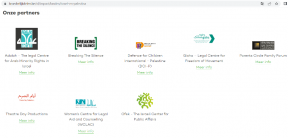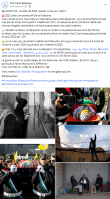Belgium Hides Political NGO Funding on Palestinian-Israeli Conflict
Introduction
According to Belgian law, the Belgian government must approve a Joint Strategic Framework (JSF) in order to distribute foreign development assistance around the world. JSF documents, formulated jointly by the Belgian NGOs that implement aid programs and approved by the Belgian government, outline common strategies for delivering aid. As described below, they reveal not only details of specific development projects, but also government-endorsed policy goals, including advocacy.
In general, transparency is an essential element of democracy, particularly related to the use of taxpayer funds. Given the use of public money for supposedly non-controversial humanitarian work, and the partnership between NGOs and the Belgian government to execute foreign policy, there is a reasonable expectation that the JSFs would be made public.
Yet, while the Belgian NGO umbrella organization ACODEV has published all of the JSF frameworks for 2022-2026 funding around the world, they refused to release the JSF for the West Bank and Gaza.
The Belgian Government Defends the Secrecy
On March 22, 2023, Belgium Minister for Development Cooperation Caroline Gennez responded to a parliamentary question posed by MP Kathleen Depoorter, stating that “The NGOs themselves decide, on the basis of their autonomy, whether or not the JSF is shared.” Doubling-down on the lack of transparency, Gennez suggested that MP Depoorter approach ACODEV in order to obtain information on the Belgian government’s West Bank and Gaza aid strategy. In other words, the Belgian government has ceded control over this aspect of its foreign policy to NGOs.
Gennez did acknowledge that under the JSF, Belgium will provide €8.7 million to five Belgian NGOs – Broederlijk Delen, Viva Salud, Solsoc, Caritas and Oxfam Novib – to focus on “the right to inclusive and quality education, training and lifelong learning opportunities, the right to health and the improvement of social determinants of health, international law, good governance and the role of civil society. The last priority concerns the right to food and resilient livelihoods in rural areas.”
Crucially, Gennez did not reveal the identities of local Palestinian and Israeli implementing partners for these projects. As NGO Monitor has previously documented, Belgium, via the Belgian organizations, has funded terror-linked Palestinian NGOs (see below).
Belgian Government Supports Political NGOs as “Mitigating Pro-Israel Voices”
In July 2020, NGO Monitor uncovered that the 2017-2021 JSF for the West Bank and Gaza committed its NGO signatories to promoting anti-Israel campaigns through advocacy and lobbying in Belgium and the EU, including “Mitigating the influence of pro-Israel voices” (emphasis added). On this basis, the Israeli Minister of Foreign Affairs issued a demarche, reprimanding Belgium’s ambassador to Israel.
Belgium Funding to PFLP-Linked NGOs
In October 2021, the Israeli Ministry of Defense (MoD) designated six Palestinian NGOs as terror organizations. According to the MoD, these groups, including Defense for Children International-Palestine (DCI-P), Bisan Center for Research and Development (Bisan), and Health Workers Committee (HWC; designated in January 2020) are operated by and for the benefit of the PFLP.
In the context of the 2017-2021 JSF, Belgium funded Bisan, DCI-P, and HWC, via Belgian NGOs:
- Bisan – €337,892 via Viva Salud
- DCI-P – €170,800 via Broederlijk Delen
- HWC – €297,925 via Viva Salud
(For more information, read NGO Monitor’s report “Belgian Funding for PFLP-Linked NGOs.”)
Notably, Broederlijk Delen – which is receiving €1.4 million (2022-2026) from the Belgian government’s Directorate-General for Development Cooperation (DGD) for a West Bank and Gaza “Lobby and advocacy” project – lists DCI-P as a partner.1
Similarly, Viva Salud, receiving €1.3 million from DGD (2022-2026) for “a strong social movement to uphold the right to health and food of the Palestinian people,” lists Bisan and HWC as its partners.2


